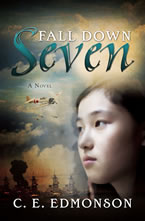Article first published as Book Review: Fall Down Seven by C.E. Edmonson on Blogcritics.
April 19, 2014
WINNER OF THE 2014 TYLER R. TICHELAAR HISTORICAL FICTION AWARD
Fall Down Seven: A Novel
C.E. Edmonson
ISBN: 9781414124698
Wine Press Publishing (2013)
Award-Winning World War II Novel about Japanese-Americans a Tear-Jerker
 Winner of the 2014 Reader Views Literary Awards for Best Historical Fiction, Fall Down Seven is the moving and dynamic story about a Japanese-American family’s experiences when World War II begins.
Winner of the 2014 Reader Views Literary Awards for Best Historical Fiction, Fall Down Seven is the moving and dynamic story about a Japanese-American family’s experiences when World War II begins.
Written from the perspective of thirteen-year-old Emiko Arrington, this young adult novel will appeal to readers of all ages because of its graceful and enlightening handling of a difficult subject. The way Japanese-Americans were treated in the United States during World War II is history that many of us would like to forget, but it deserves to be remembered all the more as a result.
On December 7, 1941, Emiko and her family witness from a distance the bombing of Pearl Harbor, an event that will soon put her own family in peril. Emiko’s father is a white, American-born lieutenant commander in the U.S. Navy, and consequently, he is soon called to fight in the Pacific. Emiko’s mother, Arika, is a Japanese-born woman who came to the United States at the age of six with her family. Her parents have since returned to live in Hiroshima, while her brother, a professor on the West Coast, is sent to a Japanese internment camp. While most Japanese in Hawaii were not interred in these camps, like the Japanese on the West Coast were, Emiko’s father feels that she, her eight-year-old brother Charles, known as “The Whizz,” and her mother would be safer going to Connecticut to live with his sister, Emiko’s Aunt Ellen.
After bidding goodbye to their father, Emiko and her family make the journey from Hawaii to Connecticut. When they reach California, they are immediately treated with prejudice and risk being sent to an internment camp themselves, but fortunately, they have a letter of authorization to travel to Connecticut, signed by an admiral. Once they get on a train, they are taunted by American soldiers, but they receive kindness from a negro porter, who apparently sympathizes with them since he is also a second-class citizen in America because of his race.
When the family arrives in Connecticut, life does not become any easier for them. Aunt Ellen is not overly friendly; she is not used to children or visitors, but she has an empty house, and her own husband is away fighting in the war; however, she means well and sticks up for the family when needed. Nearby lives Uncle Ralph and his wife, son, and infant daughter. The son shares The Whizz’s love of baseball and Uncle Ralph soon proves to Emiko that she can confide in him.
Outside their relatives, however, Emiko and her brother and mother face constant prejudice everywhere they go. Emiko and her brother experience prejudice at school and Emiko is even tripped at a track meet. The local church’s board even wants to oust the family from attending services. Through it all, Emiko is forced to draw on her inner strength and courage, hold her head up, and believe that she and her family have the same rights and are as American as everyone else.
The novel’s title comes from a Japanese proverb that Emiko’s father constantly repeats to her, “Fall down seven times, get up eight.” At times, Emiko wonders whether she’ll have to fall down fifty times, but she never forgets the proverb and keeps going.
Author C.E. Edmonson has done a magnificent job of capturing a realistic thirteen-year-old girl’s point of view during World War II and weaving in the good and the bad of her experiences. While he could have written a novel about a Japanese family in an internment camp, I think by writing about a half-white family, he allows readers to see how prejudice barriers are broken down in communities, including pointing out that many of the Connecticut neighbors who encounter Emiko’s family are of German descent, yet they are not blamed for what Hitler and the Nazis are doing, so Emiko and her family should not be blamed for what the Japanese emperor and his armies are doing. From religion to sports to family bonding, Edmonson thoroughly covers the experiences of people during World War II, whether of European, Asian, or African descent, making this a universal novel that will appeal to all, and while I won’t give away the ending, or say whether it is happy or sad, I admit my tears were flowing when I came to the final pages.
To learn more about Fall Down Seven and C.E. Edmonson, visit www.ceedmonson.com.
— Tyler R. Tichelaar, Ph.D. and award-winning author of Narrow Lives and The Best Place

